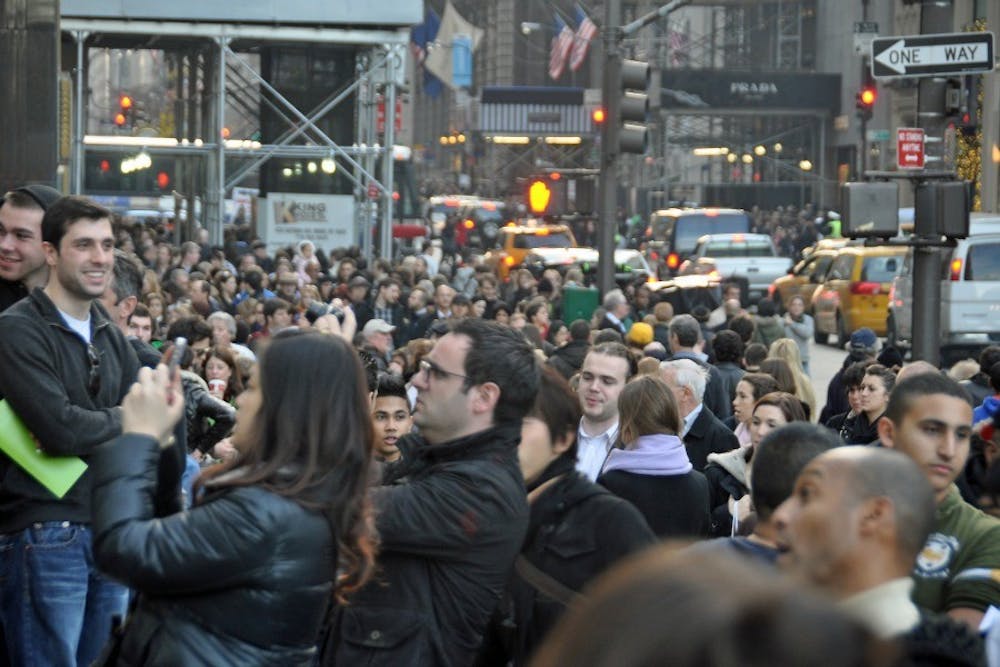The following piece, written by the editorial editors, reflects the majority opinion of the editorial board.
Can we not be content with what we have for one moment? Toss a football around outside with your siblings or cousins. Sit and have a cup of coffee with your grandpa. Start a card game with your relatives. Spend the day doing real, human activities.
Or is the shopping craze of Black Friday the most accurate reflection of our values as a society? The day after giving thanks for what we have - the only day of the year we designate to do so - we go right back to thinking about ourselves, and how much more we want and need, how much more we can buy.
Sometimes we don't even wait until the next morning, as more and more stores are opening their doors in the early evening hours of Thanksgiving day. This phenomenon is forcing employees away from dining room tables at their relatives' homes, and into work, where they will spend their holiday faking smiles and asking, "Would you like your receipt with you or in the bag?"
However, this year marked a change, as Black Friday in-store sales nationwide decreased. RetailNext, an analytics firm, reported that the overall number of customers shopping dropped 1.5 percent, and the average spending per customer fell 1.4 percent. There were fewer shoppers, and those who showed up spent less.
It may not be that Black Friday is becoming less popular. It may just be that stores or companies have made it easer to avoid the physical act of shopping. A lot of Black Friday deals start earlier in the week, and a lot of the hassle can be avoided by shopping online.
This is supported by a survey released by the National Retail Federation, which reported more people shopped online than in brick-and-mortar stores this weekend.
In-store shopping is decreasing in popularity, not only because of the ease of online purchasing, but also because consumers can find good deals year-round at outlet stores and online sites like Sierra Trading Post, Overstock.com and The Clymb.
Or maybe people are getting tired of being bombarded by a steady stream of emails, starting weeks out from Thanksgiving and advertising "SHOP NOW!"
They don't want to interrupt their holiday gathering to trek out to the nearest superstore to dig through piles of DVDs searching for the last copy of "The Fault in Our Stars." They are forgoing waiting in a three-hour line just so they can triumphantly exit a store with the newest high-definition television or a $5 toaster.
Instead, maybe they want to be present and enjoy one holiday before moving on to the next. Many people complain that commercial businesses "rush the season," putting Halloween items out in late August, and Christmas decorations out the day after Halloween. Why are we always looking to the future? Can't we be content with what is happening right now?
This morning, The New York Times reported MasterCard estimated shoppers bought more on Dec. 23 last year than on Black Friday, likely in a late scramble for Christmas gifts.
We would like to believe this decrease in Black Friday in-store purchases is a signal of a cultural shift, a societal rejection of the consumer circus that is Black Friday.
Shoppers are getting smarter. They are researching first, to make an informed decision about what they need and why they need it. They are venturing out only for the most important items, which can benefit everyone. Less in-store traffic means shoppers can get in and out faster. Fewer people means less stress for employees and a more enjoyable experience for everyone.
Black Friday can be a good thing - who doesn't like to get a head start on their holiday shopping, and save a few bucks doing so? It's when we let the chaos of buying more goods overshadows the true reason for the holiday that it becomes problematic.
Our singular humanistic holiday should go beyond the money people spend, the goods they consume and the blind fury in which they do it.

